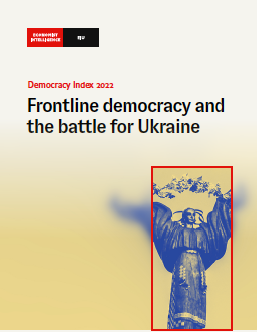Given that Israel is often taken as symbolising the evils of colonialism and imperialism it is instructive to see how it scores in an objective international ranking of democracy. According to the recently published EIU Democracy Index 2022 (available to download free here) Israel ranks 29th out of 167 countries and territories included in the survey. That clearly makes it far from perfect but it still puts it in the top 20% of the world’s countries. It is just below Portugal in the ranking and (perhaps surprisingly) just above America.
The Economist Intelligence Unit (EIU), a respected research and analysis outfit, has no particular stake in the Israel debate. So its country rankings can be taken as an attempt at achieving objectivity. A degree of subjectivity is unavoidable but it should at least give a reasonable estimate of the state of Israeli democracy compared with other nations.
In short it classified Israel as a ‘flawed democracy’. In broad terms that means it has free and fair elections and basic civil liberties are respected but it can have other shortcomings. According to the EIU these can include: “significant weaknesses in other aspects of democracy, including problems in governance, an underdeveloped political culture and low levels of political participation”.
In fact Israel's 2022 ranking was six down on the previous year. That was mainly because the RAAM (United Arab List) party lost its place after a brief stint in the ruling coalition. The EIU was also concerned about the election of a new government including far right parties and plans to weaken judicial independence.
The EIU uses five sets of criteria in its rankings: electoral process and pluralism, functioning of government, political participation, political culture and civil liberties. Israel scored particularly poorly in the civil liberties category.
However, despite its faults, it should not be forgotten that Israel scored better overall than most other countries. In fact the Middle East and North Africa region scored worst of all the regions covered. In that sense Israel’s frequent boast of being the only democracy in the region is true but it is perhaps claiming less than many assume. Of the other countries ranked in the region only two, Tunisia and Morocco, were ‘hybrid regimes’ (meaning democracy is seriously circumscribed) and the rest were classified as ‘authoritarian’.
Unfortunately it is not possible to have a serious public discussion on Israel as long as it is viewed as a symbol of the evils of colonialism. That is the significance of calling it an ‘apartheid’ state or deriding as a ‘settler state’. Those who make such claims are generally not interested in balanced debate but in deligitimising a country they regard as epitomising wickedness.

